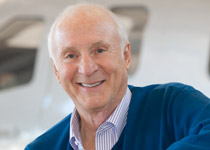GENERAL
- From reader John Schmidt: Mike Howard, an airline pilot from Manchester, England, walked a tightrope in 2004. What made this feat so unique?
- Who was the only sitting president of the United States to travel on a regularly scheduled airline flight?
- Who was first to fly solo around the world?
- From reader Stephen Rosenbaum: The shape of the fuselage of the first supersonic airplane, the Bell X-1, was borrowed from that of a _______.
- From reader Hy Chantz: An amphibian can operate from land or water. What U.S. Air Force airplane was a triphibian?
- During straight-and-level flight, why must the wings of a typical airplane produce more lift than the weight of the airplane?
- Estimate within 3,000 the number of homebuilt aircraft currently registered with the FAA.
- What is the distance between Point A (68 degrees, 35 minutes north, 44 degrees, 40 minutes west) and Point B (75 degrees, 50 minutes north, 135 degrees, 20 minutes east)? Hint: This problem can be solved using pencil, paper, and simple arithmetic.
TRUE OR FALSE
- A unique feature of the North American/Ryan Navion is that it may be flown with its canopy removed.
- A pilot is taking off at sea level in an airplane with a reciprocating engine and a constant-speed propeller. The propeller control is fully advanced and the throttle is wide open. Propeller pitch, therefore, is at a minimum.
MULTIPLE CHOICE
- From reader Charles Baumann: The first airplane to be equipped with a flight recorder was:
a. a Douglas DC-3.
b. a Ford Tri-Motor.
c. the Spirit of St. Louis.
d. the Wright Flyer. - From reader Richard Wilsher: NASA’s space shuttle Enterprise was named after:
a. the USS Enterprise, the world’s first nuclear- powered aircraft carrier.
b. a starship used in television’s Star Trek.
c. a rent-a-car enterprise.
d. a particularly enterprising community in Florida. - A pilot is using the left traffic pattern for Runway 36 to practice a rectangular course. Wind is from the northwest at 20 knots. The steepest bank angle will be required when turning from:
a. upwind to crosswind.
b. crosswind to downwind.
c. downwind to base.
d. base to final. - From reader Chet Steele: The “Father of Instrument Flying” is generally considered to be:
a. James “Jimmy” Doolittle
b. Paul Kollsman
c. William Ocker
d. Lawrence Sperry
TEST PILOT ANSWERS
- He walked a tightrope between two hot air balloons at 4,000 feet agl while blindfolded. Howard also has walked between two balloons at 18,800 feet (but not while blindfolded).
- To set an example during the fuel crisis in 1973, President Richard Nixon flew aboard United Airlines Flight 55, a DC-10, from Washington, D.C., to Los Angeles, on December 26.
- Wiley Post made the circumnavigation in a Lockheed Vega, the Winnie Mae, in seven days, 18 hours, 50 minutes (July 15 to 22, 1933).
- A .50-caliber bullet was the only shape or form known at that time to be aerodynamically stable at supersonic speeds.
- The Air Force used the Grumman Albatross for rescue operations beginning in 1947. In 1953 the amphibian was modified with skis, which made the Albatross a triphibian, an airplane capable of operating on land, water, and snow.
- For the net vertical force to be zero, wing lift must equal aircraft weight plus the download created by the horizontal tail surfaces.
- The 30,000 registered homebuilts represent 8.4 percent of the total of 357,000 aircraft currently registered with the FAA.
- Points A and B are on opposite meridians; their longitudes are 180 degrees apart, they are on opposite sides of the Earth. Point A is 21 degrees, 25 minutes south of the North Pole, which means that it is 1,285 nm miles from the pole (each minute of latitude = 1 nm). Point B is 14 degrees, 10 minutes or 850 nm from the pole on the other side of the Earth. The distance between them, therefore, is 1,285 nm plus 850 nm, or 2,135 nm.
- True. This is why legendary cinematographer and Hollywood “stunt” pilot Paul Mantz used the Navion as a camera platform.
- False. Propeller pitch is at a minimum as the throttle is advanced. When maximum-allowable rpm is reached, however, further opening of the throttle results in an increase in propeller pitch to prevent the propeller from exceeding its maximum allowable rpm.
- (d) The recorder combined a Richard anemometer and a stopwatch. These recorded the amount of air passing through the device and the time of flight. Knowing distance traveled allowed airspeed to be calculated.
- (b) The first space shuttle was to be called Constitution, but a letter-writing campaign organized by Star Trek fans (Trekkies) resulted in the name Enterprise.
- (c) Groundspeed is highest during this turn, which necessitates a relatively steep bank angle. Groundspeed is least when turning from upwind to crosswind, which necessitates a shallow bank angle.
- (c) Ocker investigated pilot disorientation in poor visibility during World War I and experimented with flight instruments—specifically the turn indicator—as a way to orient pilots. He invented the Ocker Box to convince pilots that instruments were more reliable than their senses.

Barry Schiff
Barry Schiff has been an aviation media consultant and technical advisor for motion pictures for more than 40 years. He is chairman of the AOPA Foundation Legacy Society.


